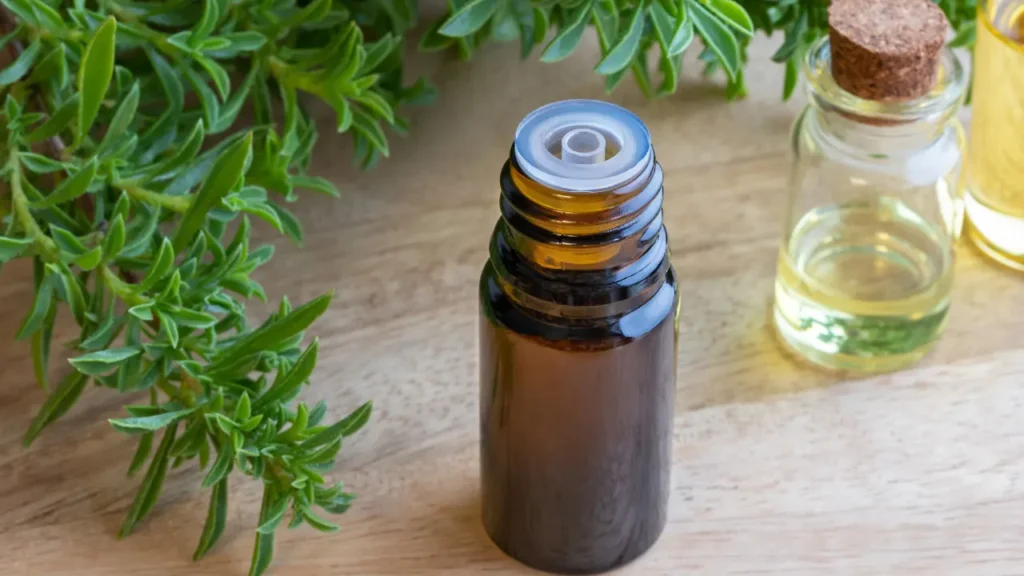The herbaceous plant known as summer savory (Satureja hortensis) is a member of the Lamiaceae mint family. This plant has both culinary and medicinal uses. Throughout Europe and North America, traditional medicine has made use of its fragrant leaves in food and medicine. This article’s main goal is to investigate the possible nootropic advantages of summer savory, especially in terms of improving cognition, alertness, and focus. We will explore its chemical composition, ideal dosage, adverse effects, possible combinations with other drugs, and the physiological processes by which it affects the body and brain.
You May Also Like:
Should You Try CBD for Focus? Here Are the Facts.
Sunmed CBD vs. Partnered Process CBD: Finding the Best CBD for Sleep
Summer Savory: Benefits, Dosage, Side Effects, Drug Interactions, and Other Important Information is an original (NootropicsPlanet) article.
Nature of Summer Savory
Summer savory (Satureja hortensis) is an annual herb native to warm temperate parts of Southern Europe and the Mediterranean. This herb is frequently used in cooking to improve the flavor of many meals because of its peppery flavor. Herbologically speaking, summer savory is a member of the Lamiaceae family of mints which also contains thyme and basil. These explain the plant’s aroma and fragrance. With delicate, hairy stems and lance-shaped leaves, summer savory reaches a height of roughly 30 to 60 centimeters. It’s not just a practical herb but also a beautiful garden plant in the summer with beautiful lilac-colored blooms.
Health Benefits of Summer Savory
Cognitive Health: Summer savory is very helpful for improving cognitive processes because of its nootropic qualities. It is thought that the active ingredients, such as thymol and carvacrol, enhance attention, alertness, and mental clarity. These effects are especially beneficial in the management of age-related cognitive decline.
Digestive Health: Summer savory is known to have beneficial effects on the digestive system in addition to its cognitive advantages. This plant can increase the production of saliva and digestive enzymes which aid in the breakdown of food and the absorption of nutrients. This can help with typical digestive issues like gas, indigestion, and bloating. The herb’s antispasmodic qualities also relax the gastrointestinal tract’s smooth muscles, lessening pain and cramping.
Antimicrobial and Antioxidant Properties: Thymol and carvacrol are two essential oils with strong antibacterial qualities and are useful against a variety of germs and fungi. Because of this, summer savory can help treat and prevent illnesses. Furthermore, the high concentration of antioxidants, especially rosmarinic acid, aids in the body’s fight against oxidative stress which is a common cause of many chronic illnesses like cancer and cardiovascular diseases.
Anti-inflammatory Effects: Numerous major illnesses, such as diabetes, Alzheimer’s disease, and heart disease, have chronic inflammation as one of their underlying causes. Summer savory contains chemicals with anti-inflammatory qualities that can help avoid certain illnesses by reducing systemic inflammation.
Support for Respiratory Health: Summer savory has antibacterial qualities that make it a good herb for respiratory health. Those with the flu, the common cold, and other respiratory conditions can benefit from its ability to help clear their respiratory tracts.

Chemistry of Summer Savory
The chemical profile of summer savory is rich and complex, comprising a variety of essential oils, phenolic acids, and flavonoids which contribute to its therapeutic properties. The primary active components include:
- Thymol and Carvacrol: These phenolic compounds are known for their antimicrobial and antioxidant activities. They play a crucial role in the herb’s ability to reduce oxidative stress and inhibit the growth of bacteria and fungi.
- Rosmarinic Acid: This compound is a potent antioxidant and has anti-inflammatory effects. It is effective in neutralizing free radicals and plays a significant role in protecting cells from oxidative damage.
- Linalool: Known for its calming effects, linalool is a terpene that contributes to the sedative properties of many aromatic herbs.
These compounds are thought to synergize to contribute to the nootropic and health-promoting effects of summer savory.
Physiological Mechanism of Action of Summer Savory
The physiological mechanisms of summer savory benefit from the rich profile of bioactive chemicals in summer savory. Two of the primary ingredients, thymol, and carvacrol, are hypothesized to modulate the levels of neurotransmitters, especially acetylcholine, and GABA, to interact with the central nervous system. Increasing acetylcholine activity can boost cognitive function because it is essential for memory and learning. In the meantime, linalool’s soothing effects can lessen stress and anxiety. This function is also a result of its modulation of GABA activity, which indirectly supports cognitive health.
Combating oxidative stress in the brain is a major function of rosmarinic acid. Over time, oxidative damage to brain cells causes permanent damage. Rosmarinic acid maintains cognitive function by reducing oxidative damage to brain cells and neutralizing free radicals. This also helps reduce neuroinflammation which is frequently associated with neurodegenerative illnesses.
By strengthening mental clarity, focus, and cognitive resilience, these acts collectively add to summer savory’s overall nootropic advantages.

Optimal Dosage of Summer Savory
The lack of clinical data makes it difficult to determine the ideal dosage for summer savory. Small amounts, such as those from culinary applications or tea preparations (about 1-2 grams of dry herb per day), may be advantageous, according to conventional uses and animal research. Lower dosages might be required for more potent extracts, such as concentrated supplements or essential oils, and expert medical advice must be taken to prevent overdose or poisoning.
Side Effects of Summer Savory
In moderation, summer savory is usually regarded as safe. High concentrations, particularly of essential oils, can be hazardous and result in systemic side effects such as nausea, vertigo, and irritation of the mucous membranes. Because the essential oils in this herb are very strong, if you are interested in using it to improve your cognitive function, you should first speak with your healthcare specialists.

Potential Substance Interactions with Summer Savory
Summer savory may interact with drugs that target neurotransmitter systems, such as cholinesterase inhibitors that are used to treat Alzheimer’s disease. This is because because carvacrol inhibits enzymes like acetylcholinesterase. Its elevation of neurotransmitter levels may also interact with antidepressant and anxiety-reducing drugs. However, these side effects are not proven in studies. Hence, you must exercise caution and see a physician before taking it along with other drugs.
Best Responsible Use of Summer Savory
Incorporating Summer savory into a regimen for cognitive enhancement necessitates a conscientious approach to ensure both efficacy and safety. Here are key guidelines for the responsible use of Summer savory as a nootropic:
Consultation with Healthcare Providers: It’s crucial to speak with a healthcare provider before using any supplement, especially one intended to improve cognition. This is especially important for people using medicine or those with pre-existing medical issues, as theoretically, summer savory can interact with medications, especially those that influence the central nervous system and blood clotting.
Adherence to Recommended Dosages: While the appropriate therapeutic dosage of Summer Savory has not been generally established due to differences in individual health state and the concentration of active components in supplements, following the prescribed amounts on product labels is critical. Overconsumption might cause gastrointestinal problems or increase the potency of sedative medicines.
Monitoring for Side Effects: Users need to keep a close eye out for any negative reactions. Summer savory is generally seen to be harmless, however, in sensitive people, it may have adverse effects including upset stomach or allergic responses. Consultation with a healthcare provider right away is recommended in case of severe adverse effects.
Sourcing High-Quality Supplements: Summer savory’s effectiveness and safety are mostly reliant on the caliber of the source. Selecting dietary supplements from respectable producers who have accreditation for excellent manufacturing procedures and offer openness regarding the sourcing of ingredients is advised.
Educational Pursuit of Understanding Mechanisms and Effects: It is advisable for users to make an effort to understand how summer savory functions as a nootropic and its possible physiological impacts. A knowledgeable consumer is in a better position to utilize nootropic pills wisely.
Integration into a Holistic Health Strategy: Summer savory ought to be viewed as a part of a more comprehensive health plan. The best lifestyle choices for promoting cognitive advantages include getting enough sleep, exercising frequently, and maintaining a healthy diet. For cognitive enhancement, relying exclusively on nootropics is less efficient and may even pose a danger to your health.
Summer savory:
Conclusion
This plant has a nice name and is known as summer savory. As the name suggests, summer savory is an annual herb that is native to the warmer temperate parts of Southern Europe and the Mediterranean. It is believed that this plant is very helpful in improving cognitive processes. Within the brain, certain active ingredients prove to be especially beneficial in improving cognitive strength.
Its antibacterial qualities also make summer savory a good herb for reducing systemic inflammation. Side effects that are related to summer savory are uncommon, however, mild to moderate side effects such as nausea, vertigo, and irritation of the mucous membranes may occur. Please keep in mind that these herbs have strong essential oils and effects on the body and it is very important to control the dosage used based on professional medical advice.

References:
- Ejaz, A., Waliat, S., Arshad, M. S., Khalid, W., Khalid, M. Z., Suleria, H. a. R., Luca, M., Mironeasa, C., Batariuc, A., Ungureanu-Iuga, M., Coţovanu, I., & Mironeasa, S. (2023). A comprehensive review of summer savory (Satureja hortensis L.): promising ingredient for production of functional foods. Retrieved from: Frontiers in Pharmacology, 14.
- Hamidpour, R., Hamidpour, S., Hamidpour, M., Shahlari, M., & Sohraby, M. (2014). Summer Savory: From the Selection of Traditional Applications to the Novel Effect in Relief, Prevention, and Treatment of a Number of Serious Illnesses such as Diabetes, Cardiovascular Disease, Alzheimer’s Disease, and Cancer. Retrieved from: Journal of Traditional and Complementary Medicine, 4(3), 140–144.
- Kumburović, I., Selaković, D., Jurić, T., Jovičić, N., Mihailović, V., Stanković, J. S. K., Srećković, N., Kumburovic, D., Jakovljević, V., & Rosić, G. (2019). Antioxidant effects of Satureja hortensis L. attenuate the anxiogenic effect of cisplatin in rats. Retrieved from: Oxidative Medicine and Cellular Longevity, 2019, 1–15.
Important Note: The information contained in this article is for general informational purposes only, and should not be construed as health or medical advice, nor is it intended to diagnose, prevent, treat, or cure any disease or health condition. Before embarking on any diet, fitness regimen, or program of nutritional supplementation, it is advisable to consult your healthcare professional in order to determine its safety and probable efficacy in terms of your individual state of health.
Regarding Nutritional Supplements Or Other Non-Prescription Health Products: If any nutritional supplements or other non-prescription health products are mentioned in the foregoing article, any claims or statements made about them have not been evaluated by the U.S. Food and Drug Administration, and such nutritional supplements or other health products are not intended to diagnose, treat, cure, or prevent any disease.


